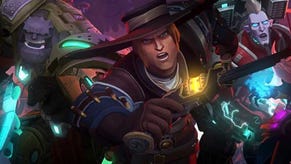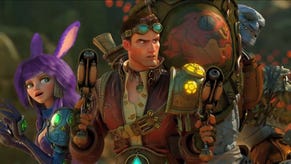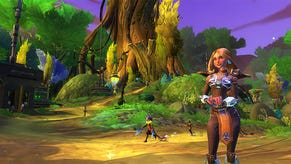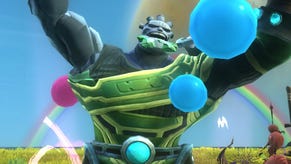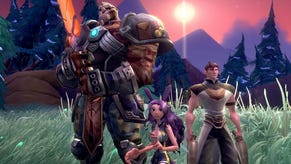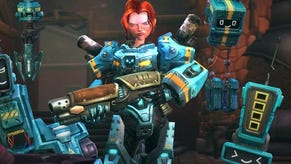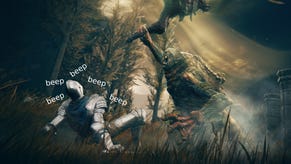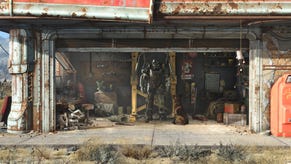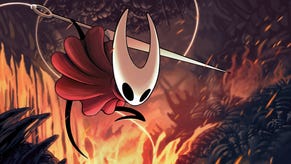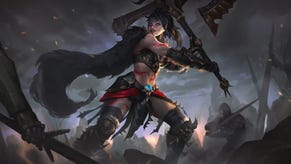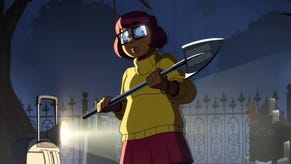Carbine announces Wildstar, aims at MMO reinvention
We played NCsoft's Wildstar in Germany yesterday, finding a risky blend of science fiction and fantasy that could change MMOs for good. Impressions and assets inside.
Wildstar is not the game I expected it to be. After playing it yesterday, and watching an hour-long explanation of why Carbine believes it's a new way forward for MMOs, I doubt my surprise will be unique.
Announced at gamescom this morning, NCsoft's Wildstar is a living cartoon, a mélange of science fiction and fantasy built by a core group of developers that drifted away from Blizzard after World of Warcraft shipped.
It's set on Nexus, a planet covered on the snowfields, forests and canyons you'd find impossible to avoid in the creation of an avatar-based exploration game, but it's rendered in such a sumptuous fashion you'd be forgiven for double-taking as to whether or not you'd fallen into a Pixar movie. Playing Wildstar is to be surrounded by a world you have never seen in a game before. Many will say "WoW in space," but from even the tiny time I spent with it yesterday that obviously isn't doing it justice.
The Eldan, the most powerful race in the galaxy have vanished, and the player characters – at once reminiscent of Marvel, Disney and Naughty Dog – crash-land on Nexus before embarking on an epic quest for truth. Or just hitting stuff with swords, if that's your bent.
The Eldan have left a planet of discovery, dripping in alien artifacts, organic environments laced with molten metal and the sort of level of polish, even at the pre-alpha stage, normally reserved for cinema.
For Jeremy Gaffney, the game's executive producer, the relief of getting Wildstar out into the open is clear.
"It's about time," he tells VG247 in an interview after the presentation, adding that the core WoW devs he inherited when he moved to Carbine some three-and-a-half years ago are, naturally, looking to ship "the next big game."
Infinity and beyond
It's clear great thought has gone into making Wildstar the next step. Gaffney's pitch is full of quotes like, "This goes beyond races and classes," and, "This is something new."
He talks about a "path" system, Wildstar's take on classes. You can explore, conquer, collect or build. Explorers carry a locator which points out apparently inaccessible items and locations in the world, while conquerors are soldiers, born to fight, level and push for glory. Collectors are scientists, constantly seeking the truth of the Eldan disappearance, while builders aim for social quests and social rewards.
Each play style is specifically rewarded with the mechanics available to it, with loot, XP, tech, or simply access to beautiful areas.
As Gaffney has it, "You know who you are. Right now, you probably already know your style.
"And what's nice about it is that you already know who your friends are."
As the system complexity suggests, Wildstar is core to the bone, a fact initially belayed by the apparently casual art style.
"We're about appealing to gamers overall," Gaffney says. "We're not trying to appeal to a specific demographic, per se. We're just hitting the style we like, that high personality, to have a really consistent look throughout.
"If you take a look at a screenshot of our game, it's out game; it's our style. You can't take a bad shot in that style. It's about being able to take things over the top. A couple of touchstones are Jak & Daxter, and so on, and there's also Team Fortress and WoW.
"Once of the nice things about having a stylized look is that MMOs are around for a long time; if you come out with a hyper-real look you're going to look dated inside of a year. If you do your job right, your game's going to be around for eight or ten years. It works in the long term."
Just because Wildstar looks like a cartoon doesn't mean it's light on challenge. There's no trying to pull World of Warcraft's trick of appealing to the casual while satisfying the core in the late-game.
Says Gaffney: "We don't walk a tightrope: we're very willing to throw ourselves right off it. It's the hardcore that matters in the long haul. If you don't appeal to the hardcore, you've got no one to get up to the high level. It's not us, you know? We're hardcore gamers. First and foremost it's to appeal to those complex gamers, those players that want the depth, and if we can make it so we're not scaring off players that are new to it, rock on. That's cool by us.
"Most important are the gamers. But we're important too. If we get bored of our game we'll make a crap game. There's no tightrope: it's hardcore first, honestly."
Layer cake
There's a section of the presentation which leaves me in no doubt just how deep Gaffney and his cohorts are looking to go. He stops showing slides to the room, and pulls over a whiteboard, before embarking on an explanation of layered content delivery and the tipping point between building sections of the game and seeing them transform into something fun.
He draws a square, and then a roof. It's a town. This is all about hunters. There's a great hunt, and you have to go into the wilderness to kill "badass stuff," namely "alien jungle cats" in long grass. There are huntresses in the play area: if you kill cats near them, you get better rewards. Then you kill the jungle cats' leader, which causes his minions to fear you, before killing the biggest dude in the zone, cutting his head off and starting "a blood feast," a public quest.
But then, you might be a scientist. You scan the cats and see that some of them are mutated. If you're an explorer, you might see that there's a giant tree, with your locator telling you there's something gleaming on top of it.
He goes on. The white board is now covered in arrows, dots, triangles, cliffs, lines and the word "path". He explains that players are allowed to find their own "momentum," that they can take on one test at a time or layer them for maximum rewards.
"I built this zone," he says, "and even as a developer there are still new things there to find."
Speaking later, Gaffney says the layer concept allows even the most hardened MMO player to ramp the challenge up to appropriate levels.
"We try to thrust so much on you that you can play it at the level you're comfortable with, but you can see that next level and you're like, 'I don't know how to do that yet but I want to.'
"That's the goal, otherwise you'll play it at a simple level and you'll never progress. We always want to keep on challenging you."
In the presentation Gaffney states the team's aim as being to create "deeply layered content," and "to have the richest world out there."
The intention is real, but my inner cynic wakes up when the experience is immediately familiar. I get to play Wildstar's early sections, where your avatar arrives on Nexus and marches down into a snowy valley on a multi-part quest to turn off a haywire Elden tower, and I find myself playing a polished section of a feature-heavy MMO. I could not be in any other genre.
The area is called The Northern Wilds, and there are three races on offer: the human, the granuk – think the rocky one from the Fantastic Four – and an impish female called an aurin. Classes available are explorer and soldier.
The UI is busy, but, again, it's unmistakably MMO. It plays like an MMO, with me rushing forward to defeat yetis with right clicks, number presses and dodge moves. I needn't have worried, though; while the mechanics may be recognizable, Gaffney's repeated assertion that Wildstar takes the entire MMO concept to "the next level" is apparently borne out. It's spell-binding. I was so enticed that I delayed my interview slightly to play, and after I'd spoken to Jeremy I went back and played again. It's rare I see a game in a press environment like that and feel such an urge to get involved. I once mocked a great man for claiming game worlds could ever suspend disbelief far enough to create a true sense of place, but I can't easily recall ever being teleported into someone else's vision of reality as quickly as I was yesterday.
Guild wars
While the intentions may be admirable, however, the details are light. There is no word on pricing models, or even a loose ship date. It's rich, yes, but there are obvious questions Gaffney skirts. When I ask him, for instance, about guild systems, he closes down.
"As a general statement we're not talking about a lot of that stuff yet, in part because we're an iterative team," he says.
"We do it, and if it's not fun we redo it. We're not going to announce stuff unless it's fun and we like it and we're going to do it. However, in general, if it's in a full-featured MMO – stuff like guilds and auction houses and crafting skills – then yeah, we'll definitely hit all the basics. In general we'll try to take those and make them interesting so that we have our own take, rather than just doing a repeat of what's come before."
What Gaffney is clear on, however, is the need for the genre to evolve.
"The MMO market has aged," he says. "Pretty much everyone you know has played an MMO at some point. It's not a huge market. There's a trickle of people coming in that have never touched one before, but everyone's tried them. So, making sure we're doing things like changing the world on a regular basis so there's always something new and interesting to do is really important to us."
The journalists that played Wildstar yesterday were the "seventh through 29th people" outside of Carbine to do so. There will be no rushing this game. The Carbine team is stupidly experienced, and is being given enough rope to hang itself. Rather than being overpowered by the responsibility, Gaffney revels in it.
"NCsoft rocks, for one simple reason: everybody's a gamer, all the way up to our CEO. We get games. TJ is willing to take risks, and that's one of the best things about NCsoft. We make games that take risks, that aren't part of the normal mix, and that's so tough to do.
"These games get so big and so expensive to make, with hundreds of guys and bunches of years: there are very few companies in the world that have the commitment to take the risk to make this kind of stuff.
"It's why you see so many games come out that are the same thing plus a little bit. It's very tough to have the corporate will to be able to put your money where your mouth is with something like that, but TJ does it and NCsoft does it. I've been at NCsoft for about 10 years, and I love the company. I have good friends here. They're good people. We'll keep on making games that are different."
Wildstar is developed by Carbine Studios for PC. It has no release date.



